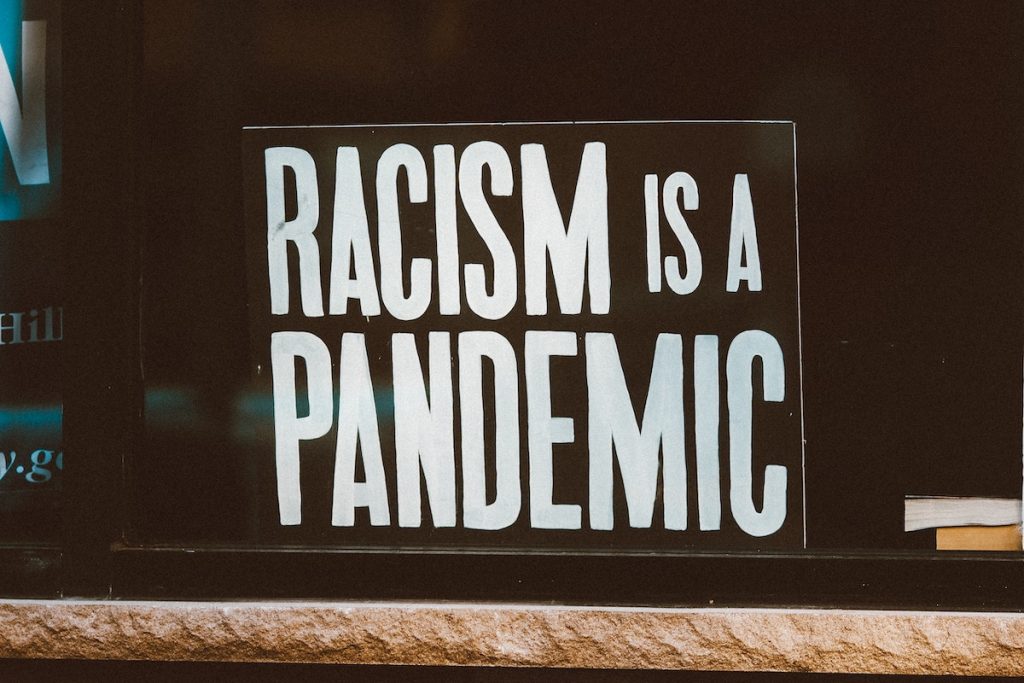Recent headlines have highlighted a troubling surge in racism and discrimination, as divisive behaviours fuel stereotypes and hostility toward ethnic and racial minorities. This is despite consistent research reinforcing how people from minoritised backgrounds are disproportionately affected by mental health problems, immigration policies and worse treatment in services.
Psychosis is a severe mental health problem that is specifically known to be more prevalent in racial and ethnic minority populations. For example, Black people are up to five times more likely to have psychosis with increased rates in Pakistani and Bangladeshi populations too (Morgan et al., 2019). Often, this is linked to systemic inequities such as disparities in education, employment and access to services, however we also know that racial hierarchies reinforce proximity to whiteness, with Black people being most affected by psychosis and the most discriminated against in society. Despite knowing this, exploring racism, a common experience of racialised minorities, is rarely reported in psychosis studies.
Studies that have tried to look at the role of racial discrimination in psychosis have used very different methods and definitions of racism, which differs between studies and countries. Since racism is a social construct, it operates in different ways depending on various factors like what is considered a racial minority, the country’s history with racist practises such as slavery, colonialism and segregation policies, as well as some countries denial of the existence of racism. However, an experience that likely affects those most at risk of psychosis is important to be considered if we are to unpick why some groups are more likely to develop psychosis than others.
A recent umbrella review (essentially a review of reviews) set out to understand what existing reviews have reported on the relationship between racism and psychosis and whether there are variations by country, samples and types of racial discrimination (Francis-Crossley et al, 2025).

Racism continues to shape mental health inequalities, with minoritised groups facing both higher risks and harsher treatment across systems.
Methods
Francis-Crossley et al. (2025) searched the major bibliographic databases for systematic reviews and meta-analyses that had explored racial/ethnic discrimination and psychosis (ranging from ultra-high risk psychosis to psychotic-like experiences) and had been published in a peer-review journal. They also completed citation searching.
They distinguished between clinical and non-clinical samples, acknowledging that psychosis may be defined differently. They also defined the type of racism experienced which allowed them to understand the systems and levels of racism that exist.
They rated reviews using a risk-of-bias tool from the AMSTAR-2 checklist to rate the quality of the reviews and the individual papers included in the review. Only quantitative records were included in this review, therefore qualitative evidence is not reported in this review. Authors noted excluding non-systematic reviews and including studies that were not published in English.
Results
A total of 1,901 records were screened from a total of 2,601 initial records, of which 700 were duplicates. After the title and full-text screening and checking the references of included papers, only 7 reviews were included in the umbrella review.
Using the AMSTAR-2 checklist, five of the reviews were rated as critically low quality, with two being rated as low quality, according to the AMSTAR-2 tool. There was a range in how much of the criteria each review met, ranging from 6% to 75%, which highlights the discrepancy in the quality of the studies. The authors noted ratings being driven by a lack of registration, statistical method quality, and a lack of bias assessment of studies included in reviews.
Across the seven reviews, 23 primary studies were included, however the authors noted that four of the included reviews did not report specific characteristics for included studies. This was mitigated by reaching out to the authors of which they were able to access the data for three of the studies, leaving data from 22 studies. All of the reviews were published after 2003 and all of the studies included were published between 1999 and 2023 and were conducted in the US (8), UK (7), Netherlands (5), Norway (1) and Romania (1). Only two studies were longitudinal, and the rest were cross-sectional (n=20).
Of the studies that reported number of participants, 40,300 participants across four reviews were reported, with three of the reviews reporting 34,250 participants from racialised backgrounds. Only one of the reviews reported age, gender and specific racial/ethnic background in line with ethnic groupings reported in the US, which means that much of the reporting is limited to the global North.
The study authors reported results according to both the exposing factor which was racial discrimination and psychosis the subsequent outcome they were looking at.
Racial discrimination
For racial discrimination, the authors reported that they were unable to draw conclusions on whether psychosis risk differed by type of discrimination because the reviews had not distinguished between the types of discrimination. They did report were:
- Two studies (reported across four reviews) reported positive associations between work-related discrimination and psychotic experiences/symptoms.
- Two of the reviews reported a study that explored markers of structural or institutional racism and increased lifetime psychotic experience through markers such as police abuse, promotion denial and loan denial. All showing increased risk of psychosis experiences.
- Six reviews included studies that explored verbal or physical attacks and perceived discrimination and physical racial attacks markers of racism and the association between psychotic symptoms/experiences. All reported positive relationships.
Psychosis
Studies looked at psychosis outcomes differently. These varied by clinical and non-clinical samples. In clinical samples:
- Some studies looked at psychosis incidence, which is the rate of new cases of psychosis develop in a given time period. Three studies explored incidence, two of which were reported as good quality, but only one found that interpersonal racial/ethnic discrimination increased the incidence of psychotic disorders (n=618). The other two studies reported no differences in perceived or vicarious discrimination and the respective outcome.
- Three studies looked at psychotic symptoms and racial/ethnic discrimination in clinical samples. Findings reported lifetime perceived discrimination was associated with psychotic disorders in a clinical sample, no association between symptom severity and perceived discrimination, but the samples were quite small (n=90, and n=70 respectively) and a positive association between perceived discrimination and prodromal symptoms in ultra-high risk participants compared to control.
Non-clinical samples
- Of the reviews, six reported data on non-clinical samples and they all found discrimination was associated with psychotic experiences.
- From the records, positive relationships between racial/ethnic discrimination, racial/religious discrimination and psychotic experiences or symptoms were reported including with specific symptoms of psychosis such as paranoia and hallucinations.
- Samples included African-American participants, undergraduate students and Moroccan migrants in the Netherlands.
Unfortunately, measures for psychosis and racial/ethnic discrimination were too different to perform meta-analyses.

Despite poor study quality, racial and ethnic discrimination was linked to greater psychotic symptoms, especially in non-clinical samples.
Conclusions
Taking into account all of the studies, the authors report that the current evidence suggests racial/ethnic discrimination is associated with an increased risk of psychotic disorders, symptoms and experiences where defined, and findings were more consistent in non-clinical samples. They report that the low-quality of the studies may be clouding differences in the study findings and that there was suggestion of publication bias.
Although the ethnicity data was sparse, the authors suggest that several groups were at higher risk of psychosis such as south Asian and Black Caribbean.
The umbrella review highlights that studies exploring discrimination and psychosis with bigger samples and better quality are required to further understand this important area of research.

Discrimination could play a key risk factor for psychosis, especially among Black and South Asian communities, but further high-quality research is required to draw conclusions.
Strengths and limitations
This umbrella review reviewed existing systematic reviews on the association between racism and psychosis using a wide range of terms that may reflect racism through perception or experience, as well as psychosis from disorder to symptoms, in both clinical and non-clinical samples. It is a strength that the authors kept the scope wide to ensure it was reviewing literature across the field that could have been defined differently.
As a result, the review was limited by substantial variation in how studies defined and measured exposures and outcomes, preventing the authors from conducting a meta-analysis.
Another limitation is that all the reviews were of low or critically low quality so the authors acknowledge that they may have amplified this bias by including these reviews and studies. Having said this, it does provide important context to the area and rationale for better quality studies.

Inconsistent definitions of racism and psychosis reveal how poorly our current tools capture the lived realities of discrimination.
Implications for practice
This timely review brings together evidence on the link between racism and psychosis. At a moment when far-right violence is again targeting minority groups, the findings are deeply relevant. The review shows that perceived racial, ethnic, and religious discrimination is consistently associated with psychotic symptoms and disorders across both clinical and non-clinical populations. Experiences of microaggression, within services and in wider society, appear to compound these harms for racialised communities. The overall message is clear: people who experience discrimination face a higher risk of psychosis, with no single group or type of experience driving the effect.
Clinically, this reinforces what research has long shown: racism and discrimination directly affect mental health and must be considered in care. Clinicians should recognise discrimination as a potential risk factor for psychosis, explore it in assessment, and tailor support accordingly. A personalised, culturally aware approach could help reduce harm and improve outcomes for racialised patients.
The review also highlights a gap in the evidence base. We need large, longitudinal studies that use consistent measures of discrimination and psychosis to strengthen comparisons and understanding. But even now, the message is stark. As racialised minorities continue to face hostility from government and far-right rhetoric, we can expect the mental health toll to grow.

Clinicians need to recognise discrimination as a real psychosis risk; addressing racism in healthcare and the wider society is central for better mental health outcomes.
Statement of interests
I have worked with the authors of this paper previously, specifically with Prof. Kirkbride during my PhD and on a current study, however I was not involved in the study reviewed in this blog.
Links
Primary paper
Francis-Crossley I, Hudson G, Harris L, Onwumere J, Kirkbride JB (2025) The association between racism and psychosis: An umbrella review. PLOS Ment Health 2(9): e0000401.
Other references
Morgan, C., Knowles, G., & Hutchinson, G. (2019). Migration, ethnicity and psychoses: evidence, models and future directions. World Psychiatry, 18(3), 247-258. https://doi.org/10.1002/wps.20655
